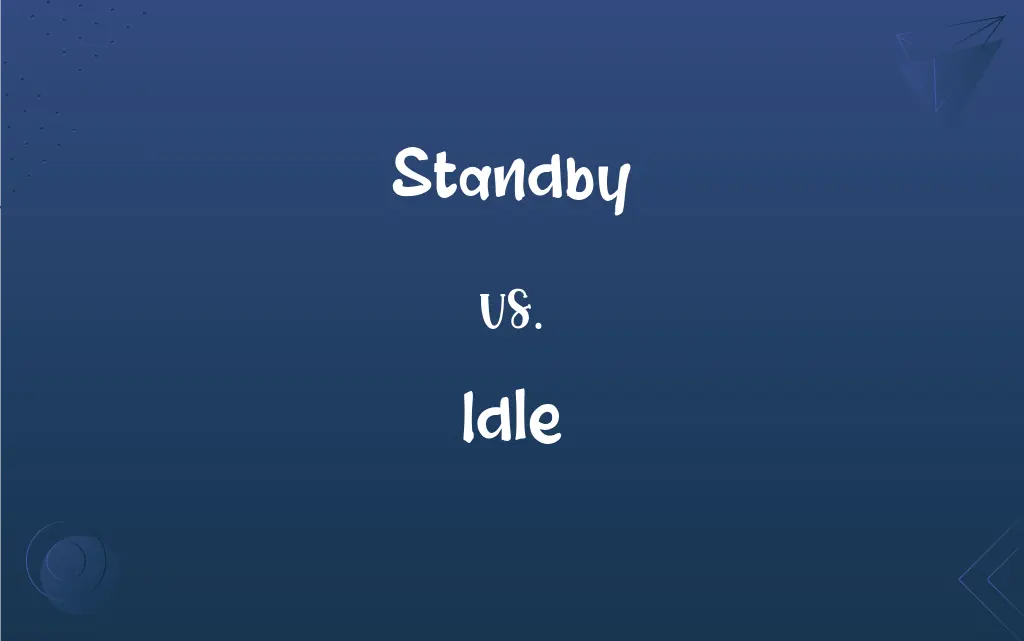Standby vs. Idle: What's the Difference?
Edited by Aimie Carlson || By Janet White || Updated on September 17, 2023
Standby refers to a state of readiness for action, often involving some low-level activity, while idle means doing nothing or being inactive, without any specific readiness for immediate action.

Key Differences
Standby is a term that implies readiness or preparedness for action. For instance, an airplane on standby is fueled and ready to take off but is waiting for a signal. In this state, it's not simply doing nothing; it's prepared for immediate deployment when called upon. Idle, on the other hand, refers to a state of inactivity where there is no specific preparation for immediate action. An idle person might be lounging with no particular intent or plan.
In the context of machinery, standby and idle have distinct meanings as well. A machine in standby mode is powered on at a low energy state, ready to spring into full action quickly. Idle machinery is simply turned off or doing nothing, with no readiness for instant action. Standby usually implies that some energy is being consumed to maintain this state of readiness, whereas idle usually consumes little to no energy.
In a technological context, like a computer or a smartphone, standby refers to a low-power state that maintains some level of activity, such as checking for updates or messages. Idle, in contrast, could mean that the device is on but not performing any tasks, or it may be completely turned off. Standby modes are often designed to facilitate a rapid return to full functionality, whereas idle states may require more time to become fully operational.
To summarize, standby indicates a state of readiness and preparedness for immediate action, albeit at a reduced level of activity. Idle represents a lack of activity and a lack of preparedness for immediate action. Both terms are context-dependent but generally imply different states of readiness and activity.
Comparison Chart
State of Readiness
Ready for action
Not ready for action
ADVERTISEMENT
Energy Consumption
Low but not zero
Usually zero or negligible
Speed to Full Function
Quick
May be slow
Context Usage
Technology, machinery, systems
People, machinery, technology
Grammatical Role
Often used as a noun or adj.
Mainly used as an adj. or verb
Standby and Idle Definitions
Standby
A substitute or backup.
She was a standby passenger on the overbooked flight.
ADVERTISEMENT
Idle
(intransitive) Of an engine: to run at a slow speed, or out of gear; to tick over.
Standby
A state of readiness for immediate action.
The firefighters were on standby for emergency calls.
Idle
Unemployed; without work.
She's been idle since the company downsized.
Standby
A mode of low energy consumption in machines.
The TV is on standby mode when not in use.
Idle
Not employed or busy
Idle carpenters.
Standby
One that can always be relied on, as in an emergency.
Idle
Disinclined to work or be active; lazy
“a man who could seem idle, ignorant, even incompetent, yet was able to understand and to express ... the instincts, good and bad, of the American majority” (Godfrey Hodgson).
Standby
One kept in readiness to serve as a substitute.
Idle
Not in use or operation
Idle hands.
Idle mills.
Standby
A mode of operation for a computer, television, or other electronic device in which the power is on and the device is ready for immediate use.
Idle
(Sports) Not scheduled to play a game
Both teams played today but will be idle tomorrow.
Standby
Kept in reserve for use when needed
A standby generator.
Idle
Being a period of time in which there is little or no activity
Passed idle hours watching TV.
Standby
Of, relating to, or waiting for unreserved travel space that is made available by an airline only shortly before departure
Standby passengers.
Idle
Lacking substance, value, or basis
Idle speculation.
Idle threats.
Standby
On a standby basis
Flew standby to New York.
Idle
To pass time without being engaged in purposeful activity
“The girls idled all day long, sending their tinkling laughter flowing up and down the street” (Alai).
Standby
A state of readiness without immediate involvement; remaining in preparation for (a sudden or unforeseen event or situation).
The troops were on standby in case of an attack.
Idle
To move slowly or without purpose
“I drove past the workshop ... I idled along the driveway past the pole fence ... to Tyhee Road” (Tom Spanbauer).
Standby
(electronics) sleep mode
Idle
To run at a slow speed or out of gear. Used of a motor or motor vehicle.
Standby
(travel) Waiting at the airport in the hope of getting a seat on a flight that is already booked out.
Idle
To pass (time) without doing anything
Idle the afternoon away.
Standby
Something that is standard, well-tested, or frequently used.
That recipe is an old standby, and she keeps the ingredients around in case of unexpected guests.
Idle
To make or cause to be unemployed or inactive
Layoffs that idled 1,000 factory workers.
A plant that was idled by a strike.
Standby
To wait briefly, as for additional communication by radio or telephone; stand by
Standby while I check that for you.
Idle
To cause (a motor, for example) to idle.
Standby
Something that can be relied on when needed
Idle
A state of idling. Used of a motor vehicle
An engine running quietly at idle.
Standby
An actor able to replace a regular performer when required
Idle
A mechanism for regulating the speed at which an engine runs at rest
Set the idle higher to keep the motor from stalling.
Standby
Ready for emergency use;
A standby generator
A standby crew
Idle
(obsolete) Empty, vacant.
Standby
A secondary role or function.
The generator serves as a standby in case of power failure.
Idle
Not being used appropriately; not occupied; (of time) with no, no important, or not much activity.
Idle hours
My computer hibernates after it has been idle for 30 minutes.
Standby
A waiting condition.
The software update is on standby until approval.
Idle
Not engaged in any occupation or employment; unemployed; inactive; doing nothing in particular.
Idle workmen
Idle
Averse to work, labor or employment; lazy; slothful.
An idle fellow
Idle
Of no importance; useless; worthless; vain; trifling; thoughtless; silly.
An idle story;
Idle talk;
Idle rumor
Idle
(obsolete) Light-headed; foolish.
Idle
(transitive) To spend in idleness; to waste; to consume.
Idle
(intransitive) To lose or spend time doing nothing, or without being employed in business.
To idle in an IRC channel
Idle
(mechanical engineering) The lowest selectable thrust or power setting of an engine.
Idle
(gaming) An idle animation.
Idle
(gaming) An idle game.
Idle
Of no account; useless; vain; trifling; unprofitable; thoughtless; silly; barren.
Every idle word that men shall speak, they shall give account thereof in the day of judgment.
Down their idle weapons dropped.
This idle story became important.
Idle
Not called into active service; not turned to appropriate use; unemployed; as, idle hours.
The idle spear and shield were high uphing.
Idle
Not employed; unoccupied with business; inactive; doing nothing; as, idle workmen.
Why stand ye here all the day idle?
Idle
Given rest and ease; averse to labor or employment; lazy; slothful; as, an idle fellow.
Idle
Light-headed; foolish.
Idle
To lose or spend time in inaction, or without being employed in business.
Idle
To spend in idleness; to waste; to consume; - often followed by away; as, to idle away an hour a day.
Idle
Run disconnected or idle;
The engine is idling
Idle
Be idle; exist in a changeless situation;
The old man sat and stagnated on his porch
He slugged in bed all morning
Idle
Not in action or at work;
An idle laborer
Idle drifters
The idle rich
An idle mind
Idle
Without a basis in reason or fact;
Baseless gossip
The allegations proved groundless
Idle fears
Unfounded suspicions
Unwarranted jealousy
Idle
Not in active use;
The machinery sat idle during the strike
Idle hands
Idle
Silly or trivial;
Idle pleasure
Light banter
Light idle chatter
Idle
Lacking a sense of restraint or responsibility;
Idle talk
A loose tongue
Idle
Not yielding a return;
Dead capital
Idle funds
Idle
Not having a job;
Idle carpenters
Jobless transients
Many people in the area were out of work
Idle
Doing nothing; inactive.
He was idle all afternoon.
Idle
Not in use or operation.
The factory machines were idle due to maintenance.
Idle
Lacking purpose or effect.
The discussion remained idle without resolution.
Idle
Running without engaging in work.
The car was idling at the red light.
FAQs
What does idle mean?
Idle means doing nothing or being inactive, without readiness for action.
Is being on standby energy-efficient?
Standby consumes some energy to maintain readiness but less than full operation.
Is being idle energy-efficient?
Idle usually consumes little to no energy.
Is idle time wasteful?
Idle time can be seen as unproductive, but it may be necessary for various reasons.
Can a machine be both on standby and idle?
Typically, no; standby and idle are different states.
Is standby a noun or an adjective?
Standby can function as both a noun and an adjective.
Is idle a noun or a verb?
Idle is primarily used as an adjective or a verb.
Can being on standby cause wear and tear?
Being on standby can cause minimal wear, depending on the device or system.
How do I know if my device is on standby?
Standby is often indicated by a light or symbol on the device.
Is standby the same as idle?
No, standby implies readiness for action, while idle means inactivity.
Does idle contribute to wear and tear?
Idle generally causes little to no wear and tear.
What does standby mean?
Standby refers to a state of readiness for immediate action.
Is it better to keep a device on standby or idle?
It depends on the need for quick responsiveness; standby for quick action, idle for energy savings.
Is standby used in aviation?
Yes, standby can refer to flights or personnel ready for immediate action.
Is idle used in transportation?
Yes, vehicles can idle when running but not moving, such as at a red light.
About Author
Written by
Janet WhiteJanet White has been an esteemed writer and blogger for Difference Wiki. Holding a Master's degree in Science and Medical Journalism from the prestigious Boston University, she has consistently demonstrated her expertise and passion for her field. When she's not immersed in her work, Janet relishes her time exercising, delving into a good book, and cherishing moments with friends and family.
Edited by
Aimie CarlsonAimie Carlson, holding a master's degree in English literature, is a fervent English language enthusiast. She lends her writing talents to Difference Wiki, a prominent website that specializes in comparisons, offering readers insightful analyses that both captivate and inform.































































